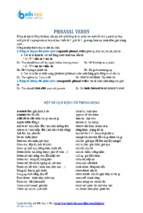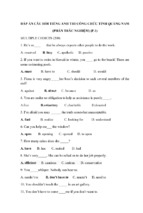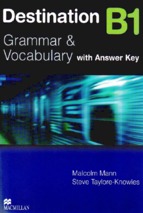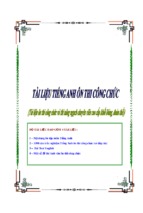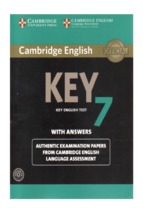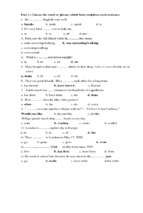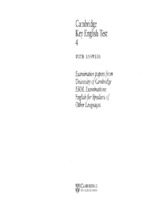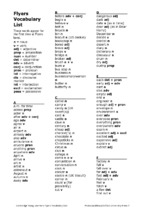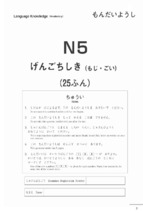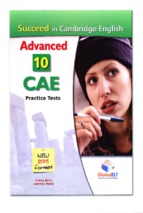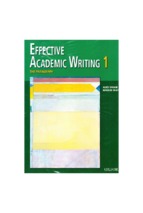bai tập ngữ pháp tiếng anh
Phrasal verbs with take exercise
October 3, 2013
Each sentence given below contains an incomplete phrasal verb. Complete the expression by
supplying a suitable preposition or adverb particle. Choose your answer from the options given
in the brackets.
1. She takes ……………………….. her grandmother. (after / off / in)
2. They assaulted the watchmen and took many precious paintings ………………………. (down
/ away / back)
3. These shoes don’t fit. I am going to take them ……………………….. to the store. (back /
away / off)
4. Don’t take him ………………….. an idiot. (for / in / off)
5. The dress was loose for me so I took it to the tailor and got it taken …………………… (in /
off / down)
6. Please take your shoes ……………………….. before entering the temple. (down / off / away)
7. How are you going to meet the deadlines if you take ………………………. too many
projects? (on / in / over)
8. If you love Susie why don’t you take her ………………………. on a date? (out / up / off)
9. He took ………………… farming after retirement. (up / in / on)
10. We will take this issue ………………………. when we meet next week. (up / on / over)
Answers
1. She takes after her grandmother. (= She resembles her grandmother.)
2. They assaulted the watchmen and took many precious paintings away. (To take something
away is to seize it by force.)
3. These shoes don’t fit. I am going to take them back to the store.
4. Don’t take him for an idiot. (To take somebody for an idiot is to assume that he/she is an
idiot.)
5. The dress was loose for me so I took it to the tailor and got it taken in. (To take a dress in is to
make it smaller when sewing.)
6. Please take your shoes off before entering the temple.
7. How are you going to meet the deadlines if you take on too many projects? (To take on is to
accept responsibilities/work etc.)
8. If you love Susie why don’t you take her out on a date?
9. He took up farming after retirement. (To take up is to begin as a hobby.)
10. We will take this issue up when we meet next week.(To take up an issue is to discuss it.)
Conditional sentences: grammar exercise
October 2, 2013
1. If you had taken the necessary precautions, none of this ………………………………..
a) would happen
b) would have happened
c) had happened
d) will happen
2. If I were you, I ………………………….. that mole examined.
a) would get
b) will get
c) would have got
c) would be getting
3. If I …………………………. a lottery, I would spend all my time traveling.
a) win
b) won
c) have won
d) had won
4. Had I realized what you intended, I ………………………………. my permission.
a) would not give
b) would not have given
c) will not give
d) had not given
5. If it …………………………………….. for your help, I don’t know what I would have
done.
a) wasn’t
b) hadn’t been
c) weren’t
d) hasn’t been
6. Were she my daughter, I …………………………… her to go out in that mini-frock.
a) wouldn’t have allowed
b) would not allow
c) will not allow
d) hadn’t allowed
Answers
1. If you had taken the necessary precautions, none of this would have happened. (In a type 3
conditional sentence, we use a past perfect tense in the if-clause and would have + past
participle in the result clause.)
2. If I were you, I would get that mole examined. (In a type 2 conditional sentence, we use a past
simple tense in the if-clause and would + infinitive in the result clause.)
3. If I won a lottery, I would spend all my time traveling. (When we use would + infinitive in the
main clause, the verb in the if-clause should be in the past simple tense.)
4. Had I realized what you intended, I would not have given my permission. (‘Had I realized’
means the same as ‘If I had realized’. If I had realized what you intended, I wouldn’t have given
my permission.)
5. If it hadn’t been for your help, I don’t know what I would have done. (We use a past perfect
tense in the if-clause when would have + past participle is used in the main clause.)
6. Were she my daughter, I would not allow her to go out in that mini-frock. (In a type 2
conditional sentence we use a past simple tense in the if-clause and would + infinitive in the
main clause. The clause ‘were she my daughter’ is actually a shortened form of the clause ‘if she
were my daughter’.)
Active and passive voice worksheet
September 29, 2013
Test your knowledge of active and passive voice with this grammar exercise. Each sentence
given below is in the active voice. Change it into passive voice.
1. He sings a song.
………………………………………………………………………………………………………
……………..
2. The boy killed the spider.
………………………………………………………………………………………………………
……………..
3. Help him.
………………………………………………………………………………………………………
……………..
4. Farmers sow maize in the rainy season.
………………………………………………………………………………………………………
……………..
5. Are you writing a letter?
………………………………………………………………………………………………………
……………..
6. The workers were digging a canal.
………………………………………………………………………………………………………
……………..
7. I will finish the job by the end of this week.
………………………………………………………………………………………………………
……………..
8. Have you finished your job?
………………………………………………………………………………………………………
……………..
9. They have informed him of his mother’s death.
………………………………………………………………………………………………………
……………..
10. They took all the necessary precautions.
………………………………………………………………………………………………………
……………..
Answers
1. A song is sung by him. (Active verb – sings; passive verb – is sung)
2. The spider was killed by the boy. (Active verb – killed; passive verb – was killed)
3. Let him be helped. (Imperative sentences in the passive voice begin with let.)
4. Maize is sown in the rainy season. (Active verb – sow; passive verb – is/are sown)
5. Is a letter being written by you? (Active verb – is/are writing; passive verb – is/are being
written)
6. A canal was being dug by the workers. (Active verb – was/were digging; passive verb –
was/were being dug)
7. The job will be finished (by me) by the end of this week. (Active verb – will finish; passive
verb –will be finished)
8. Has your job been finished by you? (Active verb – has/have finished; passive verb – has/have
been finished)
9. He has been informed of his mother’s death. (Active verb – has/have informed; passive verb
– has/have been informed)
10. All the necessary precautions were taken by them. (Active verb – took; passive verb –
was/were taken)
If or unless?
September 28, 2013
Hints
Unless has a similar meaning to if not. Study the examples given below.
Unless she works hard she will not pass.
If she does not work hard, she will not pass.
Complete the following sentences using if or unless.
1. I will take the job ………………………… the pay is too low.
2. She will not buy the house ………………………….. you lower the price.
3. They will not come ………………………… you invite them.
4. You will not lose that belly fat …………………………… you do not exercise.
5. Let’s go for a walk – …………………………… you are too tired.
6. ……………………………. you stop smoking, you will get cancer.
7. I wouldn’t be able to do it, ……………………………. she didn’t help me.
8. She will be very upset ……………………….. I don’t wish her on her birthday.
9. ……………………….. you give me the keys, I will kill you.
10. ……………………… you don’t leave this place at once, I will call the police.
Answers
1. I will take the job unless the pay is too low.
2. She will not buy the house unless you lower the price.
3. They will not come unless you invite them.
4. You will not lose that belly fat if you do not exercise.
5. Let’s go for a walk – unless you are too tired.
6. Unless you stop smoking, you will get cancer.
7. I wouldn’t be able to do it, if she didn’t help me.
8. She will be very upset if I don’t wish her on her birthday.
9. Unless you give me the keys, I will kill you.
10. If you don’t leave this place at once, I will call the police.
Much, many, a lot of, lots of etc
September 27, 2013
We can use numbers with countable nouns. For example, we can say two girls and six eggs.
Many and much
Sometimes it is not possible or necessary to give an exact number like this. Then we use a
quantifier like many.
There were many children in the park. (We don’t know the exact number of children.)
There are many mangoes on the tree.
She has many friends.
We cannot use numbers with uncountable nouns. For example, we can’t say two water or three
honey.
However, we can give an idea of amount or quantity by using the word much with uncountable
nouns. Note that much is mainly used in questions and negative sentences.
How much money do you have?
There isn’t much food left.
There isn’t much space in this room.
Some
Some can be used with countable and uncountable nouns.
I have bought some eggs. (Here we use some with the countable noun eggs.)
There is some water in the bottle. (Here we use some with the uncountable noun water.)
Some is mainly used in affirmative sentences. In negative sentences, we use any.
Is there any water in the bottle?
A lot of / lots of
A lot of / lots of can also be used with both countable and uncountable nouns. Note that there is
hardly any difference between a lot of and lots of. A lot of and lots of are mainly used in
affirmative sentences. In questions and negatives we express the same idea using much and
many.
I have watched lots of English films.
I haven’t watched many English films. (More natural than ‘I haven’t watched lots of
English films.’)
She has been giving me a lot of trouble. (Here we use a lot of with the uncountable noun
trouble.)
Concession and contrast: grammar
worksheet
September 26, 2013
Rewrite the following sentences beginning them with the given words:
1. Heworked hard, but he couldn’t pass the test.
In spite of …………………………………………………………………….
2. It was late, but we decided to go out.
Although …………………………………………………………………….
3. She is rich, but she is not happy.
Despite …………………………………………………………………….
4. She had a bad teacher. Still, she passed her exams.
In spite of …………………………………………………………………….
5. She lives next door but we rarely see each other.
Although …………………………………………………………………….
6. He faced many setbacks, but he didn’t lose hope.
In spite of …………………………………………………………………….
7. Although she is a foreigner, she speaks English remarkably well.
In spite of …………………………………………………………………….
8. In spite of earning a good salary, she finds it difficult to make both ends meet.
Although …………………………………………………………………….
9. She lives close to her office; however, she is always late for work.
In spite of …………………………………………………………………….
10. Although she works three jobs in a day, she makes it a point to spend quality time with her
kids.
In spite of …………………………………………………………………….
Answers
1. In spite of working hard, he couldn’t pass the test.
2. Although it was late, we decided to go out.
3. Despite being rich, she is not happy.
4. In spite of having a bad teacher, she passed her test.
5. Although she lives next door, we rarely see each other.
6. In spite of facing many setbacks, he didn’t lose hope.
7. In spite of being a foreigner, she speaks English remarkably well.
8. Although she earns a good salary, she finds it difficult to make both ends meet.
9. In spite of living close to her office, she is always late for work.
10. In spite of working three jobs in a day, she makes it a point to spend quality time with her
kids.
Adverbs worksheet
September 24, 2013
Adverbs are words used to modify verbs. Adverbs can also be used to modify adjectives and
other adverbs.
Fill in the blanks with suitable adverbs from the box. Write the kind of adverb against each
sentence. The same adverb can be used more than once.
Occasionally
Very
Sometimes
Never
Usually
Mostly
Rarely
Often
Once
always
1. I …………………….. go to bed at 10 o’clock. (…………………………………)
2. I have …………………. been to the USA. (…………………………………)
3. I have been to Australia just ………………….. (…………………………………)
4. I ………………….. take a bath before I go to bed. (…………………………………)
5. My grandparents live in Kerala. I visit them ……………………
(…………………………………)
6. My friends are ………………… non-smokers. (…………………………………)
7. I was …………………… impressed with her performance. (…………………………………)
8. I ………………….. go for a walk in the park. (…………………………………)
9. I watch English films …………………. (…………………………………)
10. They …………………. go out. (…………………………………)
Answers
1. I usually go to bed at 10 o’clock. (adverb of frequency)
2. I have never been to the USA. (frequency adverb)
3. I have been to Australia just once. (frequency)
4. I always take a bath before I go to bed. (frequency)
5. My grandparents live in Kerala. I visit them often. (frequency)
6. My friends are mostly non-smokers. (focusing adverb)
7. I was very impressed with her performance. (degree adverb)
8. I sometimes go for a walk in the park. (frequency adverb)
9. I watch English films occasionally. (frequency adverb)
10. They rarely go out. (frequency adverb)
Exercise 2
Complete the following with suitable adverbs. Choose from the given box.
Almost
Sometimes
Very
Clearly
There
Perhaps
1. I have ………………….. finished.
2. He is ………………… clever.
3. There is …………………. something wrong.
4. ……………….. I think I should take a long break.
5. ………………… her train is late.
6. He is ……………….. late for work.
7. She is ……………….. the right person for the job.
8. Have you ………………. wanted to run away?
9. You can see lots of flowers ……………….
10. They are ………………… beautiful.
Answers
1. I have almost finished.
Ever
Seldom
So
Certainly
2. He is very clever.
3. There is clearly something wrong.
4. I sometimes think I should take a long break.
5. Perhaps her train is late.
6. He is seldom late for work.
7. She is certainly the right person for the job.
8. Have you ever wanted to run away?
9. You can see lots of flowers there.
10. They are very beautiful.
Have had and had had
September 22, 2013
Have is one of those auxiliary verbs that can also be used as an ordinary (main) verb. When
have is used as an auxiliary verb, it helps us to form the perfect and perfect continuous tenses.
Study the examples given below.
I have finished the report.
Here the auxiliary verb have forms the present perfect tense with the past participle finished.
I have been working on that report.
Here the auxiliary have helps in the formation of the present perfect continuous tense.
Have can also be used as a main verb. In this case it is followed by an object. As a main verb,
have is used to talk about our possessions, relations, experiences etc.
I have a sister.
She has a car.
He has a nice job.
I have breakfast at 8.30.
I have a shower before I go to bed.
I have a nap in the afternoon.
When have is used as an ordinary verb, it has past and past participle forms.
I usually have bread and butter for breakfast, but yesterday I had pasta.
I had a heavy breakfast in the morning, now I don’t feel like eating anything.
The present perfect form of have is have had.
‘Have you had your breakfast?’ ‘I have had a cup of coffee, but I haven’t had anything
to eat yet.’
I haven’t had any rest since morning.
The past perfect form of have is had had (had + past participle form of have).
The past perfect tense is used when we are talking about the past and want to refer back to an
earlier past time.
She felt marvelous after she had had a good night’s sleep.
They dismissed him before he had had a chance to apologize.
Transformation of degrees of comparison
September 20, 2013
We can express the same idea using different degrees of comparison. Study the sentences given
below.
John is as tall as Mike.
Tall is an adjective in the positive degree. Here we are comparing the height of two people with
a positive adjective. If John and Mike are of the same height, Mike is not taller than John.
See how the same idea is expressed using both positive and comparative adjectives.
John is as tall as Mike. = Mike is not taller than John.
Another example is given below
Very few countries in the world are as large as China. (Positive)
China is larger than most other countries in the world. (Comparative)
China is one of the largest countries in the world. (Superlative)
No other man was as strong as Hercules. (Positive)
Hercules was stronger than any other man. (Comparative)
Hercules was the strongest man in the world. (Superlative)
No other boy in the class is as intelligent as James. (Positive)
James is more intelligent than any other boy in the class. (Comparative)
James is the most intelligent boy in the class. (Superlative)
Very few Indian saints were as popular as Vivekananda. (Positive)
Vivekananda was more popular than most other Indian saints. (Comparative)
Vivekananda was one of the most popular Indian saints. (Superlative)
Maria is not as intelligent as Sonia. (Positive)
Sonia is more intelligent than Maria. (Comparative)
When a comparison is made between two individuals we do not normally use the superlative.
Alice is the prettier of the two sisters. (More natural than ‘Alice is the prettiest of the two
sisters.’)
Verbs – mood and tense
September 19, 2013
Read the following sentences.
Alice likes English movies.
When are you going to Chicago?
Shut that door.
If I were you, I would not let him go.
You notice that sentence 1 merely states a fact. Sentence 2 asks question. Sentence 3 is a
command. Sentence 4 makes a supposition – an impossible supposition at that, because I can
never be you.
Thus we find that verbs can be used in different ways – to state facts, to give commands, to ask
questions and so on. The manner in which a verb is used is called its mood.
There are three moods in English – Indicative, Imperative and Subjunctive.
Indicative mood
Read the sentences given below.
The sun rises in the east.
My sister lives in Paris.
She works for an insurance company.
Bernard Shaw was a great writer.
As you can see, these are all simple statements of fact.
Now look at these sentences.
What are you doing there?
When does the train leave for Manchester?
What is the price of this radio?
As you can see, these are all plain questions.
When a verb is used to state a fact or to ask a question, it is said to be in the indicative mood.
Imperative mood
A sentence which contains a command, a piece of advice or a request is said to be in the
imperative mood. Sentences beginning with let are also in the imperative mood.
Examples are given below.
Shut the door. (Order)
Keep quiet. (Order)
Please take this file with you. (Request)
Let him go.
Note that the subject is not usually mentioned when the sentence is in the imperative mood.
Subjunctive mood
The subjunctive mood is not very common in modern English. It is a kind of present simple
tense. It doesn’t take the marker –s in the third person singular.
It is important that every child get an opportunity to learn.
Showing possibility using should
September 18, 2013
We can use should to say that something is probable because it is logical or normal.
I am stronger than him, so I should be able to beat him. (It is a logical possibility.)
She has been working on that project for well over two weeks. She should be able to finish in
time.
If the sky is clear, you should be able to see Mount Everest from Tiger Hill.
Aparna should be here before 7.30 – she left office at 6 o’clock.
‘I am spending the weekend with my parents.’ ‘That should be nice.’
He has worked hard. He should be able to pass the test.
Should have + past participle
This structure is used to talk about past events that did not happen.
I should have finished that report yesterday. (It was necessary for me to finish that report
yesterday, but I couldn’t.)
You should have asked my permission before using my computer. (= It was necessary for you
to ask my permission, but you didn’t do that.)
Should have + past participle is also used to talk about past events which may or may not have
happened.
9 am. Alice should have left for office. (We don’t know whether this particular event took place,
but it is a possibility.)
Should not have + past participle
The structure should not have + past participle is used to talk about unwanted things that
happened.
You shouldn’t have shouted at her. It really upset her.
Should not have + past participle is also used to talk about negative possibilities.
It is only 4.30. She shouldn’t have left her office now.
Phrasal verbs exercise
September 17, 2013
Each sentence given below contains an incomplete phrasal verb. Complete the phrasal verb and
the sentence by supplying an appropriate particle or preposition.
1. I have promised to take my kids on a vacation, but I don’t know if I will be able to save
………… enough money.
2. My dad said that he was going to see …………… sending me abroad for higher studies.
3. I am going to the airport to see …………………… my sister.
4. I will see ……………….. it that she does not get the promotion.
5. Few girls manage to see their studies ………………… after they get married and have
children.
6. I don’t think that he took the money. Somebody set him ……………………
7. He likes to show ……………….. his cars and gadgets.
8. Should someone shut him ……………….?
Answers
1. I have promised to take my kids on a vacation, but I don’t know if I will be able to save up
enough money.
2. My dad said that he was going to see about sending me abroad for higher studies.
3. I am going to the airport to see off my sister.
4. I will see to it that she does not get the promotion.
5. Few girls manage to see their studies through after they get married and have children.
6. I don’t think that he took the money. Somebody set him up.
7. He likes to show off his cars and gadgets.
8. Should someone shut him up?
Explanations
To save up is to accumulate money.
To see about something is to consider it.
To see off somebody is to bid them goodbye at the beginning of their trip.
To see to something is to make sure that it happens.
To see through something is to finish it.
To set somebody up is to incriminate them falsely.
To show off something is to show it to everybody with a lot of pride.
To shut somebody up is to make them quiet.
Infinitives after auxiliaries
September 16, 2013
The infinitive is always used without to after the auxiliaries can, could, may, might, must, will,
would, shall, should, do, does and did.
She can swim. (NOT She can to swim.) (NOT She can swimming.)
He must obey me. (NOT He must to obey me.) (NOT He must obeying me.)
She should understand. (NOT She should to understand.) (NOT She should
understanding.)
The modal auxiliary ought is an exception to this rule. It is followed by an infinitive with to.
She ought to behave. (NOT She ought behave.) (NOT She ought behaving.)
The primary auxiliaries be (is, am, are, was and were) and have (has, have and had) can be
followed by an infinitive with to.
She is to retire next year. (NOT She is retire next year.)
He has to pay the fine. (NOT He has pay the fine.)
The modal auxiliaries need and dare can be followed by an infinitive with or without to. The
grammar is different.
In questions and negatives need is usually followed by an infinitive without to. In affirmative
sentences, need is usually followed by an infinitive with to.
Need I wait any longer?
Need I consult a specialist?
You need not wait any longer.
You need not consult a specialist.
You need to wait for an hour or two. (More natural than ‘You need wait for an hour or
two.’)
You need to consult a specialist.
When need is followed by an infinitive with to, we make questions and negatives with do.
You need to sign these papers.
Do I need to sign these papers? OR Need I sign these papers? (NOT Need I to sign these
papers?)
You don’t need to sign these papers. OR You need not sign these papers. (NOT You
need not to sign these papers.)
Phrasal verbs beginning with put
September 15, 2013
The word put is used in a large number of phrasal verbs.
Put across
To put something across is to make it understood.
He failed to put his message across. (= He failed to convey his idea.)
People working in sales and marketing should be able to put themselves across well.
Put aside
To put something aside is to set it aside.
He was feeling sleepy, so he put his books aside and went to bed.
Put away
a) To put something away is to keep them in their proper place.
You must put away those toys when you have finished playing with them.
b) To put something away is to save them for later use.
She makes it a point to put away a few dollars each week.
c. To put something away is to discard it.
It is high time you put away those false notions.
d. Put away can also mean eat or drink a large quantity of food or beverages.
If he is really hungry he needs just two minutes to put away a full meal.
e) To put somebody away is to send them to jail.
They put him away for killing his neighbor.
f) To put an animal away is to subject them to mercy killing.
The dog was so badly wounded that the doctor had to put him away.
Put down
a) To put something down is to write it down.
b) To put somebody down is to suppress them.
The government called the military to put down the rebellion.
c) To put something down to something else is to attribute the former to the latter.
He put the mistakes down to carelessness.
c) To put somebody down is to regard or categorize them as..
He was put down as a chronic nuisance.
d) To put somebody down is to belittle them.
I hate men who put their wives down in front of visitors.
Absolute phrase
September 14, 2013
- Xem thêm -

